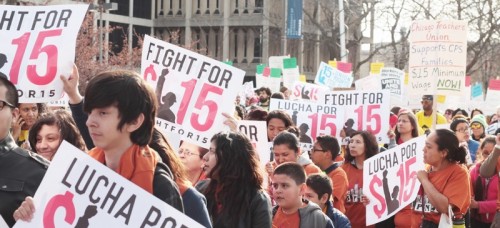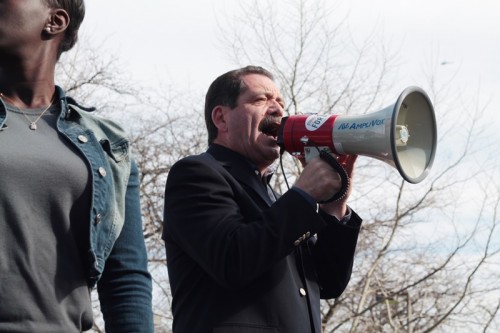
Beneath the golden rays of sunshine, protesters of McDonald’s golden arches massed by the thousands on UIC’s campus Wednesday as part of the nationwide Fight for $15 movement. Nestled in a crowd of minimum-wage workers, beneath the waving banners and a towering statue of a female worker on wheels, was 23-year-old Adriana Alvarez.
“We’ve been making poverty wages for too long,” Alvarez said. “It’s about time we make the $15 and get the rights to form a union with our retaliation.”
Alvarez has worked at McDonald’s in Cicero, a suburb that hugs Chicago’s western border, for the past five years. She lives in a basement 10 minutes from work with her three-year-old son and she hopes that someday she can move to a safer neighborhood with better schools.
Of the 40 employees at her McDonald’s, Alvarez said she was one of the “trouble starters” who encouraged her co-workers to protest. Her employers probably wish they could fire her, Alvarez said, “(but) they know better. They know it’s illegal to retaliate. It’s our right to organize.”
When Alvarez joined the resistance at her McDonald’s last year, more than 20 of the employees were involved. Now there are only 12.
“Some people left, others were too scared because they have been cutting down some of our hours,” Alvarez said. ‘But they’ve done it to everybody, so (the employers) say it’s not retaliation.”
When asked if she thought the minimum wage should be raised, Alvarez said it certainly should.
“(McDonald’s executives) are making how much a year in profit? It’s ridiculous. We’re making their money. So give us a little something back, not just these piece of crap wages we’re making,” Alvarez said.
Fight for $15 is a nationwide movement of minimum wage workers who, since 2012, have demanded not only a higher wage, but also the right to unionize. McDonald’s workers have become the face of the movement but other union rights groups joined the thousands of protesters at Wednesday’s march, including branches of SEIU, who has made significant financial contributions to the movement.
“All workers deserve a living wage, and that’s what the minimum wage is about: People having enough to get by,” Patricia Evans, a home care aide and member of Service Employees International Union (SEIU) Healthcare Illinois Indiana, said.
“We aren’t speaking of having a luxurious life. We’re looking to pay our bills,” Evans said. “There are too many employers who only pay the minimum that they can get away with. So because of that, workers need to unionize.”
DePaul associate professor James Wolfinger said Americans who work full time are good members of society and want to support their families, are understandably passionate about the Fight for $15 campaign when they only make $15,000 a year. Wolfinger said that the minimum wage has always been resisted by the argument it will restrict businesses from hiring more workers.
“There’s very little evidence that (a higher minimum wage) has a bad impact on the economy,” Wolfinger said. “In fact, if you think about how higher minimum wages for working people can help redistribute money in economy, more spending money in peoples pockets could argue (the) opposite side.”
Wolfinger also said minimum wage workers had to rely on government support for food, housing and medical care, which dug into taxpayer dollars instead of making corporations responsible.

The broader issue at hand, Wolfinger said, was not so much higher wages, but issues of social injustice and income inequality. Though unions have their weaknesses, “they can put issues on the table that otherwise too often get ignored,” Wolfinger said.
Wolfinger said the Fight for $15 movement was not only relevant to working students who would make more money on higher minimum wage, but also DePaul students who so strongly followed the Vincentian mission.
“It’s something students should be engaged with as a matter of their education about the larger world,” Wolfinger said.
“I’m really passionate about the minimum wage because there are a lot of people in my family who are working for the minimum wage,” said DePaul senior Mary L’abbate.
L’abbate grew up in government housing in New York while her father worked minimum wage jobs to get by. It took a long time for the Italian immigrant family to save enough money to move out of that situation and L’abbate said they are in a much better place now. But the experience never left her.
“The only reason that they don’t want to raise (the minimum wage) is because it’s going to cut into the cost of how many workers they can hire.”
L’abatte said the law enabling restaurants to pay workers who make tips less than minimum wage is what allows employers to hire so many workers. She said if that were to change, small businesses would suffer.
“But I think that kind of proves which kind of businesses are made to last if their workers want to make a living wage. That’s why I support (a raised minimum wage), but I can understand from a business perspective why they wouldn’t,“ L’abbate said.
At Wednesday’s march was the Restaurant Opportunities Center (ROC) Chicago, an advocate group for an equal, living wage for restaurant workers who are paid in tips and fast food workers, who are paid minimum wage. Among them was Matthew Johnson, a senior at UIC who works at Starbucks.
“All I’m doing is accruing debt and I’m not making enough money to even begin paying it off when I graduate,” Johnson said.
Johnson also worked on Jesus “Chuy” Garcia’s mayoral campaign. Garcia conceded in the runoff election against incumbent Mayor Rahm Emanuel April 7.
“Chuy’s been a big supporter of the Fight for $15 movement,” Johnson said. “I think the election as a whole and forcing a runoff will send a message to Rahm that he can’t bully us around anymore.”
Garcia made an appearance at the event and said the $15 minimum wage was about improving the quality of life of low wage earners.
“If we want to begin to dismantle inequality in America, if we want to dismantle inequality in Chicagoland, then everyone who believes in that should be supporting the Fight for $15,” Garcia said.
Evans also said the Fight for $15 was able to make change not only because minimum wages reached $15 in Seattle and San Francisco, but because the movement changed Emanuel’s mind about raising the minimum wage in Chicago.
“Our mayor was not interested in raising the minimum wage,” Evans said. “But when election time came around, and he realized every time we have a rally, hundreds of people come out, (Emanuel) started talking about a $13 minimum wage (for) 2019,” Evans said.
Juan Hume from the Indiana University-Purdue University Indianapolis held a yellow bucket above his head and vigorously pounded in rhythm to chants from the crowd.
He and his fellow supporters drove three hours to be a part of the protest.
“We’re very energized for this. I’ve seen family and friends struggle. I’ve struggled myself on minimum wage. It’s not a livable wage,” Hume said. “We’re making a stance, and we want to be heard by any means necessary.”

